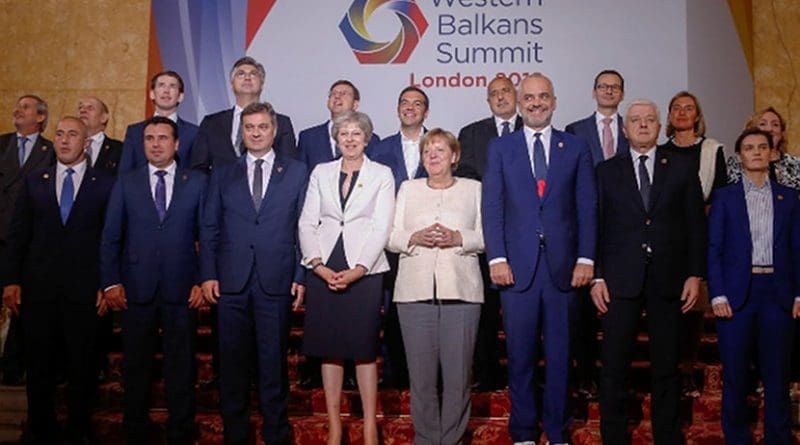UK, EU Pledge More Aid To Western Balkans
By Dusica Tomovic
At the London summit, the EU and Britain have vowed to increase their support for the Western Balkans to boost security, investment and the fight against organized crime.
Continuing the Berlin Process, European and Balkan leaders meeting in London on Tuesday agreed to discuss ways to improve growth, strengthen security and achieve reconciliation.
Heads of government and foreign ministers from the Western Balkans together with their counterparts from key EU member states and high-level EU representatives also pledged to continue strengthening regional cooperation to further advance the European integration process of the Western Balkans.
Measures to improve the collective security and economic stability of the Balkan region were also agreed at the meeting, attended by the UK Prime Minister Theresa May and German Chancellor Angela Merkel.
Representing the EU, High Representative Federica Mogherini said the EU had seen “remarkable results” in the region, and solutions to difficult bilateral issues.
“The Western Balkans are steadily moving forward. And today we reconfirm that we are together with the region on that path, sharing the commitment towards our common future,” she added.
The London summit focused on increasing economic stability with a view to improving the business environment, encouraging entrepreneurship, addressing youth unemployment, and promoting regional inter-connectivity.
It aimed also to strengthen regional security cooperation to help tackle common threats, including corruption, serious and organised crime, trafficking of people, drugs and firearms, terrorism and violent extremism.
To support these objectives the European Commission, alongside partner financial institutions, is putting forward a new “guarantee instrument” – a measure that will allow sharing financial risks to boost private investment in sectors such as start-ups and infrastructure as well as digital and social sectors.
The EU said on Tuesday that the guarantee instrument would be launched in early 2019.
With an initial EU commitment of up to 150 million euros in 2019-2020, the guarantee will aim to “leverage up to billion euro in investments” into sustainable socio-economic development and regional integration.
The summit in London was held within the framework of the Berlin Process, initiated by Germany in 2014 to improve relations within the region and accelerate the EU integration of those states that are not yet members.
The focus is on those Balkan countries that are not yet members of the EU: Albania, Bosnia and Herzegovina, Kosovo, Macedonia, Montenegro and Serbia.
With Britain set to leave the European Union next year, the UK government has said it intends to remain committed to the region’s stability, also announcing more funds for the region.
Following the meeting in London, the UK said it will almost double the funding it provides to the Western Balkans to 80 million pounds [around 90 million euros] and increase its security staff in the region to try and tackle organised crime.
Reuters reported on Tuesday that this would include improving the Western Balkans countries’ cyber capability and extending the presence of the pan-Balkans Strategic Reserve Force.
“History shows that a stable and secure Western Balkans region means a more stable and secure Europe,” UK Prime Minister May said ahead of the summit. The UK’s extra funding will be drawn from its “Conflict, Security and Stability Fund.”
By doubling the number of UK staff working in the Western Balkans on security issues that affect the UK, it hopes to reduce drug-related crime in Britain and strengthen the region’s own response to serious and organised crime and violent extremism.
A million pounds will be spent on training and advice on cyber security across the region, including direct support to “Computer Emergency Response Teams” in Serbia and Montenegro and information sharing among senior cyber officials.
According to Reuters, an additional 1 million pounds was earmarked to help the region address difficult legacy issues, including supporting organizations working to find and identify the 12,000 victims still missing from the conflicts of the 1990s.
Increasing economic stability was also in the focus on Tuesday. Further implementation of the action plan to establish a Regional Economic Area was also discussed. According to the EU press release, the economic area aims at boosting the attractiveness of the region to encourage investment and foster trade, thereby creating jobs.
When in comes to the connectivity and cooperation agenda of the Berlin Process, Western Balkan leaders agreed that the seat of the Transport Community will be in Belgrade.
The agreement on the transport community, which is intended to stimulate the harmonisation of transport legislation and bring South-east European countries in line with EU laws, was signed during the last year’s summit in Trieste, Italy.
The Western Balkan states also agreed to cooperate more on the illegal arms trade. On Monday, interior ministers from the Balkan states looked into ways to deepen cooperation in addressing shared security challenges, including fight against terrorism, radicalisation, cyberattacks and organised crime.

